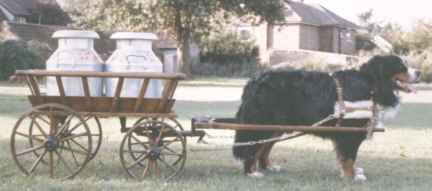The Bernese Mountain Dog
Breed Profile by Jude Simonds.
![]()
The Bernese Mountain Dog
Breed Profile by Jude Simonds.
|
The Bernese Mountain Dog is one of a
group of four native Swiss working breeds, all of which have the same striking black,
white and tan markings. The Bernese (Berner Sennenhund) is the second largest of the
group, and is the only one with a long coat – the others, The Grosse Schweizer
Sennenhund (Great Swiss Mountain Dog), Appenzeller and Entlebucher, all have the same
close lying short hair. The Bernese is the only one of the group that is bred in |
The
Bernese temperament is usually very good. They are friendly and tolerant of other
dogs, livestock and children. They are not given to hysterical behaviour or
unnecessary barking. They are intelligent and easy to train, and possess a most
definite sense of humour. Bernese need to be around people and thrive on human
company, bonding very closely with members of `their` family. It is ESSENTIAL that
Bernese live inside the house with their human family – they are NOT suited to kennel
life.
| Bernese were, and still are, used as
general purpose farm dogs. They do not have one single instinct for a particular
job, but were bred to be adaptable and biddable. The Bernese is an excellent
watchdog, a strong draught dog very willing to pull small carts and wagons, a capable
livestock drover, an attentive and loyal companion for the farmer when going about his
chores and of course a fun-loving and trustworthy children’s playmate and pet. |
 |
Although named` Mountain Dog`, the Bernese is not a giant breed like a St. Bernard or Pyrenean. Bernese can be better described as a large breed with a similar outline to a Golden Retriever but bigger, much broader and heavier. Bernese are quick to grow but slow to mature, reaching their eventual height by about 15 months old, but not reaching full maturity until about three years for a bitch and four years for a male.
 |
An adult Bernese male will measure between 64 and 70 cms (25 –
27.5 inches) at the shoulder and weigh between 36 to 55 kilos (approx. 80 - 120 lbs).
An adult
Bernese bitch will measure between 58 and 66 cms (23 – 26 inches) at the shoulder and
weigh between 34 to 46 kilos (approx. 75 – 100 lbs). (For
comparison, a German Shepherd Dog (Alsatian) male should be 64 cms (25 inches) at the
shoulder, and bitches 58 cms (23 inches) at the shoulder with a weight range of 35 –
40 kilos or 77 – 85 lbs.) For
their size, Bernese do not require a lot of exercise when compared with some working
breeds, although adults should have the ability to work actively all day if required.
When adult, Bernese will certainly enjoy a daily walk and free run and will most
certainly want to join in the family activities and excursions. However, as a breed
the Bernese does not have that `need`, an inbuilt `drive`, for marathon jaunts every day,
and growing puppies need to be protected from the inevitable damage caused by
over-exercise. Young Bernese under one year old should not be allowed to become
overtired, and care should be taken to prevent accidents or behaviour which will cause
distress and damage to the delicate yet fast growing skeleton of puppies. |
Bernese
are a hardy breed and like to spend time out of doors, provided they can see and hear what
is going on inside – definitely a breed who do NOT want to miss out on what is
happening around them. Bernese like to sit – just SIT – in the garden and
look at the sky and watch the birds, but shut the door and they definitely want to be back
on the INSIDE with you! Bernese do not seem to worry about cold weather
conditions, but they should be protected from weather extremes and should not be allowed
to lie outside in wet or frosty weather. Some young Bernese love play in mud and
puddles, whilst some others are much more clean living! Even those who enjoy mud baths do
not make good kennel dogs – far from it – a Bernese will be very miserable if
left alone or away from the house and family. It is essential that your Bernese
should live as part of your family if you are to enjoy the full character, intelligence
and devotion so natural to this breed.